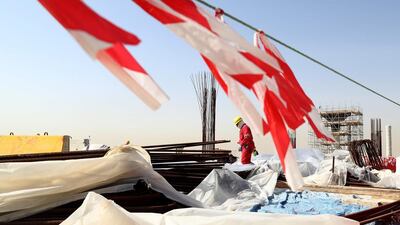Qatar is spending $500 million a week to bring one of the biggest events in sport to the Arab world for the first time. The road to football’s 2022 World Cup has been mired in controversy ever since Qatar won the bid to host it seven years ago.
But the country — the richest in the world per capita — committed $200 billion to develop at least eight new stadiums, a $35 billion metro and rail system, and a new city for 200,000 people. It also plans to double the size of its airport to handle as many as 53 million passengers a year.
But since Saudi Arabia, the UAE and Bahrain shut down all transport links, getting all sorts of buildings essentials, from cement to door handles, into Qatar is difficult. Construction continues for now despite the loaded lorries left stranded in Saudi Arabia and the tons of cargo languishing in Emirati ports. .
. All but one of the 26 container ships that called on Qatar last month stopped at one or more ports in the UAE.To restore reliable access to imports, “dedicated feeder services would have to be set up to and from Qatar, which may take time to effect,” said Neil Davidson, senior analyst of ports and terminals at London-based Drewry Shipping Consultants Ltd. “he cost of any alternative routing would undoubtedly be higher than the current set-up.”
Qatar is very dependent on the UAE’s ports and logistics chains. More than 30 per cent of the UAE’s non-oil exports in the third quarter of 2016 were to Qatar, according to the latest data from the UAE’s Federal Competitiveness and Statistics Authority. Those shipments consisted mostly of sulphur, earths and stones, plaster, lime and cement used by the construction industry.,
More pressing than a football tournament in five years’ time is the task of keeping Qatar’s oil and gas industry humming, and energy companies are stockpiling materials and equipment, according to two distributors in Doha.
One of them said his biggest clients, state-run Qatar Petroleum and its LNG subsidiaries, are buying up all his supplies and asking for confirmation that he can fulfil future orders, but he has 47 cargo loads stuck in Jebel Ali, the port of Dubai, and was trying to get them re-exported via Oman or Kuwait.
.
A manager at a building supplies company, who also asked not to be identified, said he ordered lorries that were marooned at the Saudi border to drive instead to Oman, more than 500 kilometres in the opposite direction. From there, he plans to arrange for ships to load the goods at Sohar or another Omani port and deliver them by sea. Some items in Jebel Ali that he needs to complete a project will come to Qatar via air freight, he said.
Qatar will endure the worst of the cut in trade links, but the winners in the Gulf dispute appear so far to be nearby countries that are sitting on the sidelines: Oman and Kuwait.
Bloomberg

